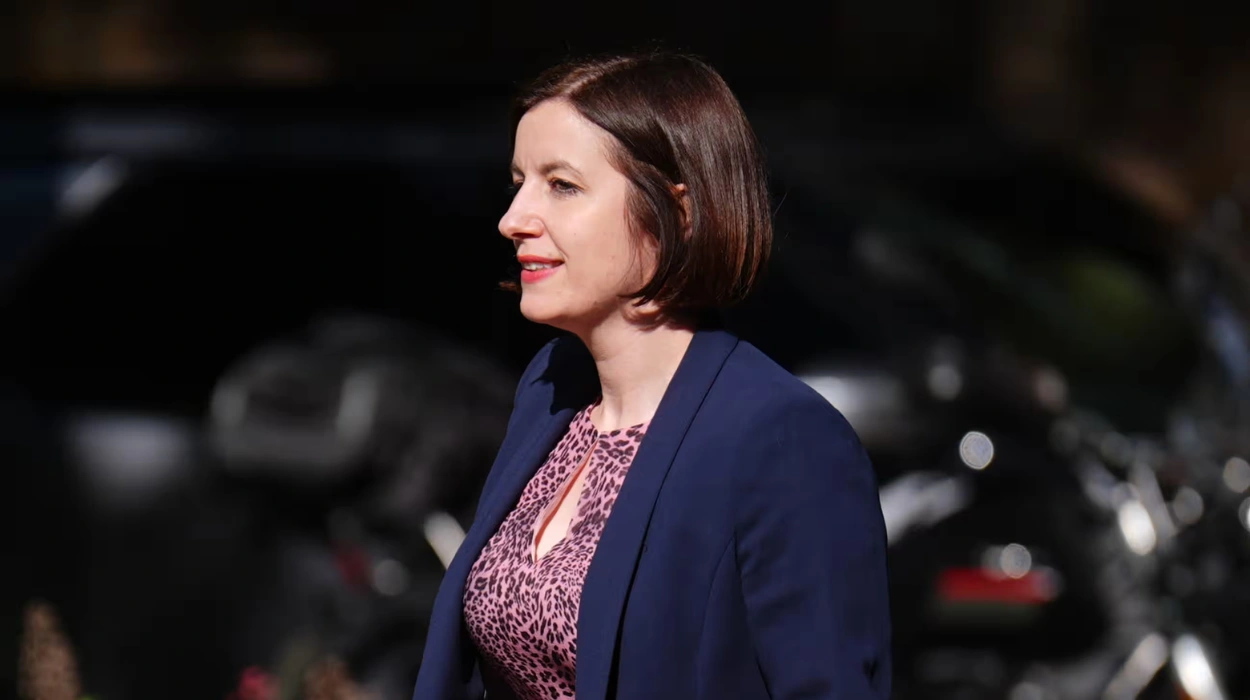Kyiv (Parliament Politics Magazine) – The UK government pressed to introduce Ukrainian GCSE for refugee kids, preventing retrauma linked to Russian language education.
As reported by The Guardian, the children’s commissioner, alongside officials in Kyiv, has called on the British government to launch a Ukrainian-language GCSE, supporting young refugees in navigating the severe challenges of displacement.
It was revealed last December that Ukraine expressed serious concerns over many Ukrainian teens being forced to study Russian in British schools due to the absence of a Ukrainian GCSE.
What steps are being taken to reintroduce the Ukrainian GCSE in UK schools?
Oksen Lisovyi, Ukraine’s education minister, met with UK education secretary Bridget Phillipson to highlight concerns that teaching Russian retraumatizes Ukrainian teenagers fleeing Putin’s war.
After meeting Ms Lisovyi, Ms Phillipson revealed on Instagram that she had urged exam boards to bring back a qualification discontinued in 1995 due to insufficient interest.
The Department of Education has established a task force to oversee the rollout of the plan.
AQA, among the exam boards, confirmed it is carefully reviewing the possibility of bringing back the qualification. However, education insiders express doubt over the move’s practicality.
What did Rachel de Souza say about reintroducing the Ukrainian GCSE?
The children’s commissioner, Rachel de Souza, has reportedly urged officials to bring back the Ukrainian GCSE. After visiting St Mary’s, a network of 13 Ukrainian language institutions in the UK, established at the trust’s base in West London.
She stated,
“I’ve seen for myself the great work St Mary’s Ukrainian School is doing with the children who attend. It has become a sanctuary for families, helping displaced children reach their goals and aspirations despite the immense upheaval they’ve experienced.”
Ms De Souza welcomed the Department for Education’s move to address the issue with exam regulators.
She said,
“I have long called for the DfE to consider making qualifications available in Ukrainian for these children, who rightly want an opportunity to feel proud of their culture and their language, so I am really pleased to see this,”
adding,
“Ukrainian children living here in the UK are the future of their country and will play a vital role in its recovery, so we must match their level of ambition and make sure they receive all the support possible to thrive in their education.”
What did AQA say about introducing the Ukrainian GCSE?
An AQA spokesperson stated,
“We’ve every sympathy with Ukrainian students who, through no fault of their own, find themselves many miles from home and want to gain formal accreditation of their language.”
They added,
“As an education charity, we stand ready to do what we can to support Ukrainian students. We have received a letter from the education secretary about developing a GCSE in the Ukrainian language and are considering it carefully.”
What did Ukraine’s Education Ministry say in the letter to Bridget Phillipson?
Ukraine’s Ministry of Education supported the proposal, stating,
“Establishing a Ukrainian GCSE centre will provide these children with opportunities to take Ukrainian GCSE and A-level exams, supporting their educational and professional goals.”
The statement highlighted that demand for the qualification has surged due to the rising number of children fleeing to the UK under the Homes for Ukraine program.
The letter said,
“As of now, the number of potential students of Ukrainian descent interested in pursuing Ukrainian GCSE is at an all-time high: about 27,000 displaced Ukrainian children and around 7,000 diaspora children.”
It added,
“Maintaining proficiency in Ukrainian is crucial for displaced children’s transition back to Ukraine, especially as many families may decide to reunite when it is safe.”
What did the DfE say about introducing a Ukrainian GCSE?
A DfE spokesperson stated,
“This government has set out our decisive support for our Ukrainian friends. That’s why we have, last week, asked exam boards to consider introducing a Ukrainian GCSE – giving these young people the chance to celebrate their heritage and their native language.”
What did Inna Hryhorovych say about Ukrainian children taking Russian GCSEs?
The head teacher of St Mary’s Ukrainian School, Inna Hryhorovych, which supports around 2,500 displaced Ukrainian children nationwide, said many students are “being encouraged—or in some cases, pressured—to take Russian GCSEs.”
She stated, “I think the schools act from the best intentions for the children – but quite often it’s not discussed on another level other than boosting the grade it might have.”
Ms Hryhorovych said,
“Sometimes the schools will also push, [and say] ‘oh, you’ve got [grade] 9 in Russian GCSE, why don’t you do A-level?’ So it doesn’t stop there,”
adding,
“We’ve heard more about the cases in the private schools. Because in state schools, the children often have to find a way to study Russian externally… in private schools, they [sometimes] offer the teacher in school.”
Ukrainian refugees in the UK
- Approximately 254,000 Ukrainian refugees are recorded in the UK as of 2025 8.
- This includes arrivals under the Homes for Ukraine Sponsorship Scheme (126,456 via individual sponsors and 28,795 via devolved government sponsors) and other routes like the Ukraine Family Scheme.
- Two-thirds of adult arrivals are women, as men aged 18–60 are typically restricted from leaving Ukraine


